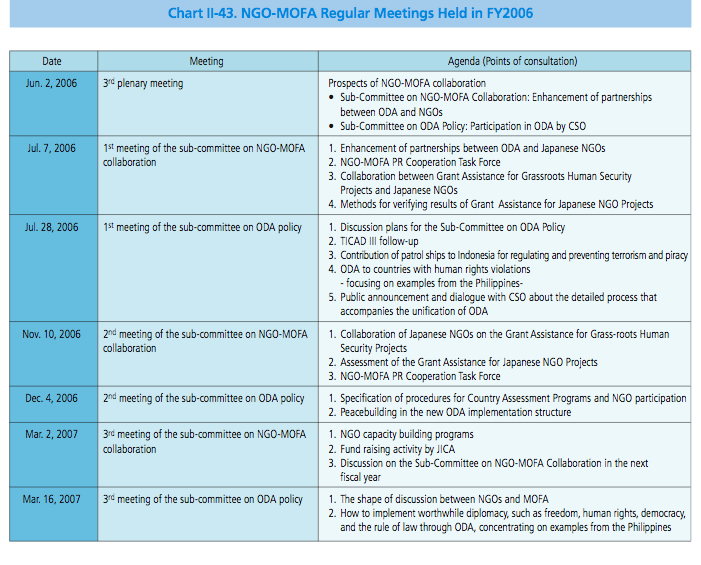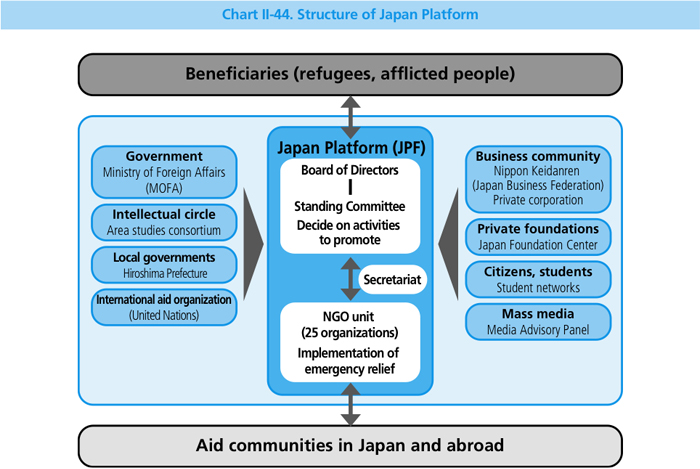Japan's Official Development Assistance White Paper 2007
Main Text > Part II ODA ODA Record for FY2006 > Chapter 2 Details about Japan's Official Development Assistance > Section 6. Formulation and Implementation of Aid Policy > 1. System for Formulation and Implementation of Aid Policy > (6) Cooperation with Aid-Related Entities within and Outside of Japan
(6) Cooperation with Aid-Related Entities within and Outside of Japan
Japan is implementing international cooperation in collaboration with NGOs, universities, local governments, international organizations, other countries and private sector enterprises.
<Collaboration with NGOs>
With the help of various forms of support, Japan's NGOs provide assistance tailored to development needs in a wide range of fields including healthcare, education, and water supply, and as a result have earned high praise in Japan and in the recipient country. NGOs' activities are becoming more important in following respects: (1) they conduct activities at the community level with local residents of developing countries and regions and they are capable of providing fine-turned assistance that meets the diverse needs of developing countries and regions; (2) they are able to implement promptly and flexibly emergency humanitarian assistance activities in the case of large-scale national disasters; (3) they give Japan a visible presence; and (4) they are able to conduct activities in regions the government cannot reach. In recent years, NGOs have been carrying out various activities not only in the fields of development assistance and emergency humanitarian relief, but also in the fields of environment, human rights, trade, disarmament and non-proliferation. Their role in the international community is thus expected to become increasingly significant.
1) Basic Policy of the Government
The government, recognizing the increasing presence and role of NGOs, stipulated strengthened coordination with NGOs in the 2003 revision to the ODA Charter. In addition, in the Medium-Term Policy on ODA formulated in 2005, coordination and collaboration with NGOs is cited on a number of occasions.
In order to bolster the activities of Japanese NGOs, the Government provides financial support for NGO activities overseas, and promotes dialogue and cooperation with NGOs and a variety of cooperative efforts designed to strengthen the basis of Japanese NGOs.
2) Assistance for the Activities of NGOs
The government provides the following financial support to the activities of the Japanese NGOs:
(a) Grant Assistance for Japanese NGO Projects
Grant Assistance for Japanese NGO Projects established in FY2002 is a system through which project funding is provided to Japanese NGOs that carry out economic or social development activities in developing countries or regions. In FY2006, a total of ¥2 billion was provided to 52 projects through 32 organizations in 24 countries and 36 projects through 13 organizations in five countries via the Japan Platform (JPF).
(b) The JICA Partnership Program
The JICA Partnership Program is implemented between Japanese NGOs and the Japan International Cooperation Agency (JICA), which collaborate on technical transfer projects that have a direct effect on improving the lives of local residents in developing countries. At the time of the program's establishment, its initial budget for FY2002 was ¥0.95 billion, and in FY2006 this increased to ¥1.99 billion.
The government assists the Japanese NGOs in their efforts to build their own capabilities. In recent years, Japanese NGOs have enjoyed high appreciation for their remarkable activities in international cooperation on the ground. However, efforts are required for many Japanese NGOs to enhance their expertise and organizational and managerial capacity in order to function better in providing development assistance. With this in mind, MOFA, JICA, and the Foundation for Advanced Studies on International Development (FASID) are implementing a variety of programs through government funding.
(c) Projects for Creating Environments for NGO Activities
In view of the common concerns of Japanese NGOs and the current international trends in assistance, MOFA in FY2006 convened NGO Study Groups on four themes:5 the role of educational assistance in disaster recovery, protection while providing humanitarian relief, fundraising, and the role of network NGOs. In addition, 17 persons were designated as NGO Advisors,6 who deal with all types of inquiries, and 11 persons were dispatched to 11 NGO organizations as NGO Researchers7, MOFA has also assisted in strengthening the capabilities of NGOs in various ways through activities such as a joint seminar with overseas NGOs on the theme of learning new approaches to poverty from African NGOs, the Accountability Seminar, and so on.
3) Dialogue and Cooperation between NGOs and Government
The Government is promoting dialogue and cooperation with NGOs. MOFA has been organizing the NGO-MOFA Regular Meetings since 1997, which have proactively discussed ODA policy and the Grant Assistance for Japanese NGO Projects. ODA implementing agencies, JICA and the Japan Bank for International Cooperation (JBIC), hold regular meetings and receive views from NGOs on aid projects. In developing countries, where many Japanese NGOs are active, since 2002, a system known as "ODA Embassies" has been in operation, whereby embassy officials, JICA, and NGO personnel engage in consultations on how to make development assistance more effective and efficient. The "ODA Embassy" system has been utilized in a total of 13 countries to date, including Cambodia and Bangladesh.
In addition to these consultations NGOs and the Government both in Japan and overseas, the Japan Platform (JPF) was founded in 2000 through close coordination among NGOs, government and business circles. A total of 258 participating NGOs in the JPF swiftly launch and implement emergency humanitarian assistance activities utilizing public and private funding that had been provided in advance. The JPF rapidly deployed the emergency humanitarian assistance activities at the occurrence of the earthquake disaster in Central Java, Iraq, Liberia, Sudan, Timor-Leste, and Lebanon in FY2006. The ODA fund spent in these operations amounted to approximately ¥1.0 billion.
4) Future Perspective of Cooperation with NGOs
The Government is taking measures to extend and diversify cooperation with NGOs through frequent and closer dialogue with them, taking into account challenges and demands NGOs have in order for them to conduct social and economic development activities as well as emergency humanitarian assistance activities more proactively on the ground in developing countries.
Chart II-43 NGO-MOFA Regular Meetings Held in FY2006

Chart II-44 Structure of Japan Platform

<Collaboration with Academia and Local Governments>
In FY2006, to realize the benefits of improving project quality, developing assistance staff, and stimulating regionally-initiated projects, JICA collaborated with academia in various technical assistance projects, such as dispatching technical experts, accepting trainees and foreign students, and implementing JICA Partnership Program and collaborative lectures. In recent years, technical assistance projects have increasingly been implemented comprehensively by means of agreements with universities, whereby the intellectual assets possessed by individual universities are expected to be utilized in stimulating and improving the quality of projects and in developing assistance staff.
Meanwhile, for universities, collaboration with JICA has the advantage of facilitating access to project sites in developing countries and providing opportunities to gain practical experience. Therefore, in recent years, JICA has introduced a framework for comprehensive collaboration with universities (collaboration and cooperation agreements, memoranda) in order to build cooperative relationships within an organizational structure, and has concluded nine agreements and memoranda with 13 universities, including Obihiro University of Agriculture and Veterinary Medicine, Hokkaido University, and Hiroshima University. Collaboration with universities will be further promoted so as to use their knowledge in international assistance projects.
Several initiatives were launched associated with loan aid projects including: (1) the organization of regular consultations with universities with which agreements for cooperation concerning overseas economic assistance operations have been concluded (11 universities in all); (2) provision of Japan's expertise and knowledge in cooperation with experts of local governments and universities (e.g. Kita-Kyushu University, Ryukyu University in Okinawa Prefecture, and Shimane University) to afforestation projects in India and water environment development (plumbing) projects in China at the project development stage; (3) promotion of mutual understanding and information exchange through consultations with local governments and globalization associations in Japan; (4) the organization of loan aid partnership seminars which include the visits to loan aid project sites (China was visited in FY2006) for the purpose of collaborating with highly experienced and knowledgeable Japanese organizations (e.g. NGOs, local governments, private sector enterprises, and universities).
<Collaboration with local governments of developing countries and with overseas NGOs>
It is important to seek collaboration with the local governments and NGOs of developing countries. Japan provides assistance to projects implemented by local government and local NGOs through Grant Assistance for Grass-roots Human Security Projects. Large-scale projects by the governments of developing countries are not eligible for this instrument. Japan has earned reputation for providing flexible support directly to the grassroots level. This aid can be expected to contribute not only to the development of developing countries, but also to strengthening their NGOs and civil society.
In FY2006, Japan provided assistance to Zimbabwe by cooperating with the international NGO World Vision Zimbabwe in response to a serious water shortage in the country's second largest city Bulawayo due to the drying up of a dam reservoir caused by a drought in recent years.9 Specifically, Japan installed pumps in previously dug wells to allow reuse of well water in six districts where the socially disadvantaged of Bulawayo lived and educated well users in proper methods of using well water and in sanitation, thereby improving the living environment and health of residents.
<Collaboration with Private Sectors>
It is important to utilize advanced technologies and expertise of Japanese companies, when Japan's assistance is provided. One example of this kind of collaboration with private sectors is Special Terms for Economic Partnership (STEP) on loan aid program. STEP is the system, introduced in 2002, which utilizes Japanese advanced technologies and know-how to promote technical transfer to developing countries. Under the terms of STEP, contractors are limited to Japanese companies so as to enhance the visibility of Japanese aid through implementing ODA projects and utilize advanced technologies possessed by Japanese companies.
Until its revision in October 2006, when STEP had been applied to loan aid projects, it had been stipulated that more than 30% of the total amount of contracts to be financed by loan aid (excluding consulting services) be used to procure goods from Japan. In October 2006, the terms and conditions were revised. Not only goods but also services concerning construction are included in this ratio in the case of projects which are expected to utilize advanced technologies of Japanese companies such as methods of construction.10 This revision is expected to promote the utilization of STEP.


 Next Page
Next Page